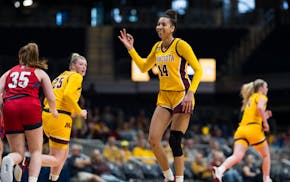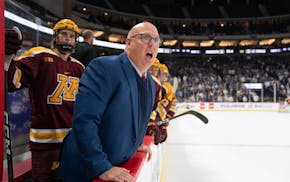INDIANAPOLIS – College football is a sport steeped in tradition, from Michigan vs. Ohio State, to the Iron Bowl, to the Army-Navy game and to the beautiful view of the San Gabriel Mountains as the sun sets at the Rose Bowl.
Another tradition in college football was that coaches and administrators had control over player movement, with the ability to deny transfers up until October of 2018, when the transfer portal was launched.
It's been a game-changer since, and nowhere was that clearer than at the Big Ten football media days last week. Of the Big Ten's 18 teams after the conference's West Coast expansion, 14 teams are expected to begin the season with a starting quarterback who has transferred at least once. Only four squads are expected to a have a home-grown starter.
"The biggest takeaway is, like always, you have to embrace change," said Iowa coach Kirk Ferentz, the dean of college football coaches who's starting his 26th season in Iowa City. "It is inevitable. It's part of what we do, and certainly it's part of college football right now."
Only Michigan (junior Alex Orji), Nebraska (freshman Dylan Raiola), Penn State (junior Drew Allar) and USC (junior Miller Moss) have presumptive starters from within the program.
Ferentz likely will start Michigan transfer Cade McNamara, whose 2023 debut season with the Hawkeyes was scuttled because of injury.
Travel 300 miles north of Iowa City, and you'll find another Big Ten coach jumping headfirst into the transfer portal quarterback pool. Seeking to fix a passing attack that's been among the least productive in major college football over the past three seasons, Gophers coach P.J. Fleck quickly settled on New Hampshire transfer Max Brosmer.
A Georgia native, Brosmer was a top-three finalist for the Walter Payton Award, given annually to the top player at the FCS level, and he brings accuracy, poise and leadership — areas Fleck wanted to upgrade after Athan Kaliakmanis had an inconsistent season in 2023.
"Our quarterback situation was different than a lot of others," Fleck said from Lucas Oil Stadium. "We were going to take a portal quarterback to come in and start and play right away. Somebody had to come in and engulf the program, fit the culture, want to be there for all the right reasons."
Brosmer is eager to show what he can accomplish at a higher level.
"It's an extremely cool opportunity," Brosmer said. "I've always wanted to play at the highest level, especially the Big Ten."
Brosmer, a graduate transfer, has one season to make his mark on the Gophers. So far, Fleck hasn't wavered in his praise.
"He's exceeded my expectations, and I had some pretty high expectations from him," Fleck said.
Transfers at the top
Ohio State and Oregon are the overwhelming choices to finish first and second in the Big Ten standings, and both the Buckeyes and Ducks will have a transfer running the offense.
In Oregon's case, that's Dillon Gabriel, who spent the past two seasons at Oklahoma after starting his collegiate career at Central Florida. Gabriel has passed for nearly 15,000 yards and has 125 touchdown passes in his career.
"What's impressed me the most about Dillon is his ability to connect, not just in our program, but outside our program," Ducks coach Dan Lanning said. "I'm excited about the experience he brings to the position."
At Ohio State, coach Ryan Day now has Chip Kelly as his offensive coordinator. They'll be working with Will Howard, who played 34 games over four seasons at Kansas State. Howard completed 61.3% of his passes and had 24 touchdown tosses for the Wildcats last year.
"Chip is here for a reason, to run the offense, but I think it's my job as the head coach to look on the horizon and figure out what's coming," Day said. "In this conference, I have experience of what's coming down the road, the games we need to win, how we need to win."
Last year, Washington made it all the way to the College Football Playoff Championship with Michael Penix Jr., a transfer from Indiana, leading the Huskies. He's off to the NFL, and coach Kalen DeBoer took the Alabama job vacated by Nick Saban.
Jedd Fisch, the former Arizona coach and one-time Gophers offensive coordinator, replaced DeBoer at Washington. Ex-Mississippi State QB Will Rogers, who passed for more than 12,000 yards over four seasons in Starkville, steps in for Penix.
"He has 40 starts as a college football player, and he's the son of a coach," Fisch said of Rogers. "He has an incredible football mind, football acumen."
With so many transfer quarterbacks in the Big Ten, there will be weekly matchups between two such players. One to circle for local purposes is Nov. 9 at Rutgers, when Fleck takes his new quarterback, Brosmer, to face his old quarterback, Kaliakmanis, who won the Scarlet Knights' starting job during spring practice.
Brosmer vs. Kaliakmanis will garner attention and show how coaches must adjust on the fly — especially at the sport's most important position.
"College football is so different now with the changes that have happened even in the last year," Rutgers coach Greg Schiano said. "The ability to adapt, to pivot, to make changes is critical."
Expected Big Ten starters who transferred
Team, Name, Former team
Gophers, Max Brosmer, New Hampshire
Illinois, Luke Altmyer, Ole Miss
Indiana, Kurtis Rourke, Ohio University
Iowa, Cade McNamara, Michigan
Maryland, MJ Morris, N.C. State
Michigan State, Aidan Chiles, Oregon State
Northwestern, Mike Wright, Mississippi State/Vanderbilt
Ohio State, Will Howard, Kansas State
Oregon, Dillon Gabriel, Oklahoma/Central Florida
Purdue, Hudson Card, Texas
Rutgers, Athan Kaliakmanis, Minnesota
UCLA, Ethan Garbers, Washington
Washington, Will Rogers, Mississippi State
Wisconsin, Tyler Van Dyke, Miami (Fla.)
Non-transfers in line to start
Michigan, Alex Orji
Nebraska, Dylan Raiola
Penn State, Drew Allar
USC, Miller Moss
Reusse: When it's all said and done, Bueckers wants the final say
Wild drop game to Rangers in overtime, mistakes turning costly over and over

Gophers women's basketball team rolls against Belmont for WBIT title
Twins wait out the rain, then hammer out a win over the White Sox
